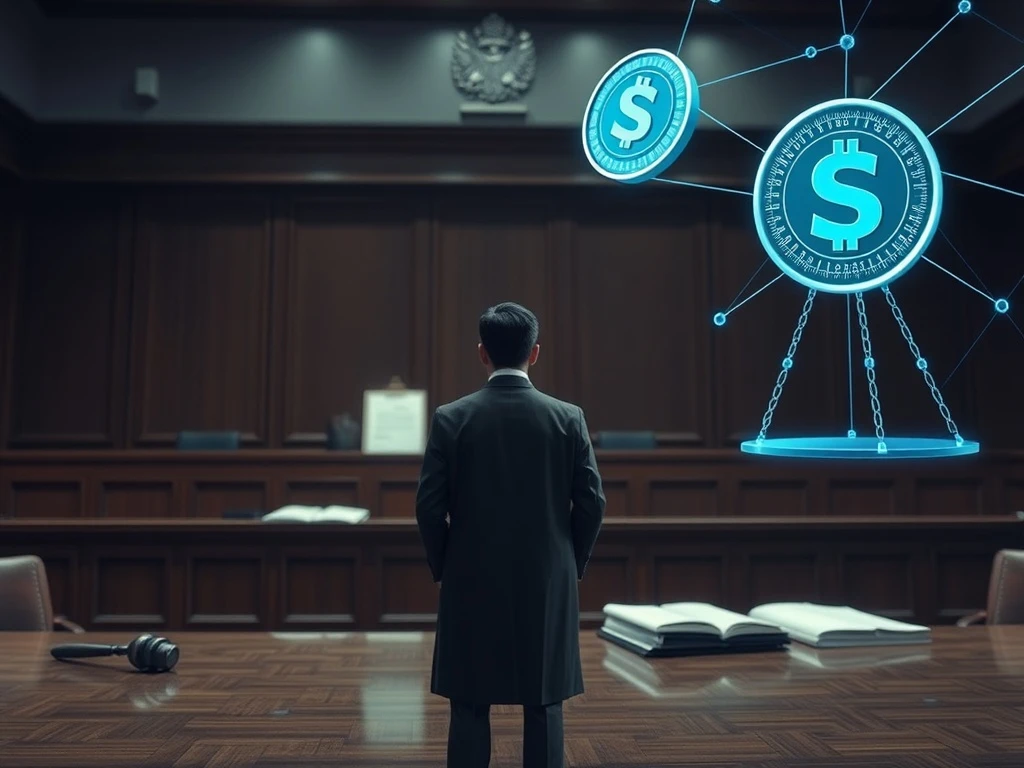Do Kwon’s Fate: How US Crypto Laws May Drastically Reshape His Landmark Case

The high-stakes legal battle surrounding Terraform Labs co-founder Do Kwon just took an unexpected turn, highlighting the dynamic interplay between evolving US crypto laws and complex criminal proceedings. With bills like the GENIUS Act making their way through Congress, the very foundation of the charges against Kwon could shift. This pivotal development underscores the significant impact that legislative changes can have on ongoing legal cases within the cryptocurrency space.
The GENIUS Act’s Unexpected Role in Do Kwon’s Defense
In a recent status conference, Judge Paul Engelmayer, overseeing the criminal case against Do Kwon, reportedly indicated he was “mindful of the GENIUS Act.” This seemingly simple statement carries immense weight, suggesting that new legislation could directly influence the securities fraud charges Kwon faces. The Guiding and Establishing National Innovation for US Stablecoins (GENIUS) Act, which recently passed the US Senate, is poised to address payment stablecoin regulations. If enacted, this bill could redefine how stablecoins like TerraUSD (UST) are classified under US law.
For Kwon, whose charges are intricately linked to the collapse of UST and its sister token LUNA, a change in legal classification could be a game-changer. The core of many crypto-related fraud cases, including this one, often hinges on whether a digital asset is deemed a security or something else. The GENIUS Act aims to provide clarity on stablecoin regulation, potentially offering a new legal framework that might affect how past actions involving these assets are judged.
Unpacking the Impact of US Crypto Laws on Securities Charges
Do Kwon faces nine felony counts, including securities fraud, commodities fraud, market manipulation, and money laundering. These charges stem from the 2022 depegging of Terra’s UST, which led to the ecosystem’s collapse and massive investor losses. The ongoing debate within US crypto laws about whether certain digital assets are securities, commodities, or a new class altogether, is central to Kwon’s defense.
The Securities and Exchange Commission (SEC) has historically taken the stance that many cryptocurrencies, especially those offered through initial coin offerings (ICOs) or that resemble investment contracts, are unregistered securities. However, the legislative efforts, including the GENIUS Act and its companion the STABLE Act, are designed to create a specific regulatory framework for stablecoins. Should these bills become law, they could introduce definitions and oversight mechanisms that differ from existing securities laws, potentially leading to a re-evaluation of the charges against Kwon related to UST and LUNA.
It’s also worth noting that a jury in 2024 already found Terraform Labs and Kwon liable for defrauding investors in a civil case with the SEC. Judge Engelmayer is reportedly exploring whether these civil rulings would be binding on the criminal case. This adds another layer of complexity, as the interpretation of existing laws could be influenced by, or in turn influence, the new legislative landscape.
Stablecoin Regulation: A Shifting Legal Landscape
The push for comprehensive stablecoin regulation reflects a broader desire within the US government to bring clarity to the digital asset market. The GENIUS Act, alongside the STABLE Act in the House of Representatives, represents significant legislative momentum. These bills aim to establish clear rules for how stablecoins are issued, backed, and operated, potentially mitigating future market disruptions and protecting consumers.
The implications extend beyond Do Kwon’s case. Any new legislation could:
- Redefine Asset Classification: Provide clear guidelines on what constitutes a payment stablecoin, potentially separating it from traditional securities definitions.
- Clarify Regulatory Jurisdiction: Help delineate the roles of financial regulators like the SEC and the Commodity Futures Trading Commission (CFTC) in overseeing digital assets.
- Impact Future Cases: Set precedents for how authorities approach new crypto projects and past incidents, offering a more predictable legal environment for the industry.
While the prospect of new laws influencing ongoing trials is unusual, it’s not entirely unprecedented. In 2024, former SafeMoon CEO Braden John Karony’s legal team also sought to delay his criminal trial, hoping that anticipated changes in securities laws might affect his charges. However, Karony was ultimately found guilty, illustrating that legislative shifts are not a guaranteed path to acquittal.
What’s Next for Terraform Labs and Do Kwon?
Do Kwon, who pleaded not guilty to all charges, remains held without bail in the US, with his criminal trial tentatively scheduled for January 2026. The potential impact of the GENIUS Act introduces a significant variable into an already complex legal battle. The prosecution will need to adapt their strategy if the legal definitions underpinning their charges are altered, while Kwon’s defense team will undoubtedly leverage any favorable changes.
The scale of the Terra ecosystem collapse was immense, with court filings suggesting the number of Do Kwon’s victims could exceed one million. This highlights the severe human cost behind the legal complexities. The resolution of this case, particularly in light of evolving US crypto laws, will set a crucial precedent for how future crypto-related alleged crimes are prosecuted and how the industry operates under US jurisdiction.
Conclusion
The Do Kwon criminal case is a focal point where the past, present, and future of cryptocurrency regulation converge. The judge’s acknowledgment of the GENIUS Act underscores the critical influence that new US crypto laws can have on existing legal battles. As Congress continues to debate and potentially enact legislation aimed at stablecoin regulation, the legal landscape for digital assets is undeniably shifting. The outcome of Kwon’s trial, shaped by these legislative developments, will not only determine his fate but also send a powerful message about accountability and the evolving legal framework for the entire crypto industry.






